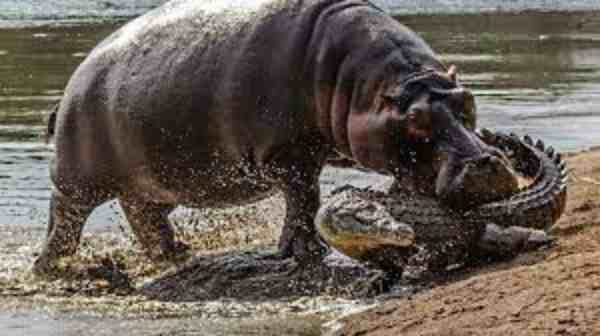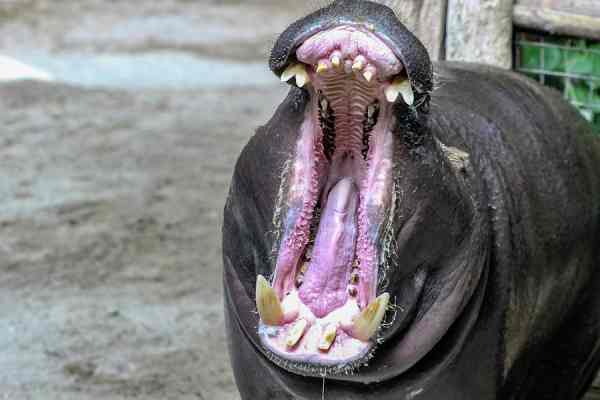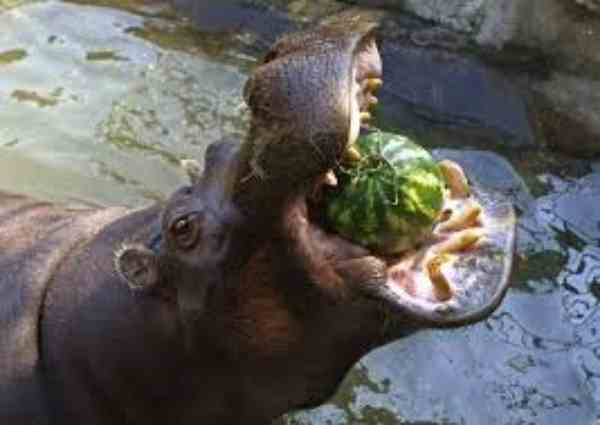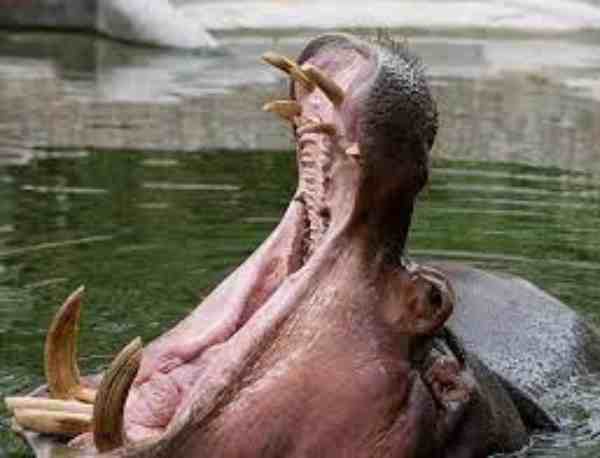People would probably say the lion is the king of the jungle if you asked them. But if you asked them who the king of Africa’s waters is, they might not know. Hippos are the answer! Even though these huge animals look cute with their big cheeks and fat bodies, they are one of the most dangerous animals in Africa. Still, a hippo’s size is so big and its tusks are so big that you might be curious about how strong a hippos bite force is. You will find all these answers in this article.

Table of Contents
How Big Are Hippos?
The family Hippopotamidae includes the enormous mammal known as the hippopotamus. The pygmy hippo is the sole additional member of this family. With some individuals reaching as much as 6,000 lbs, the common hippo is the third-largest land animal after elephants and rhinos in the world. Pygmy hippos resemble mini hippopotamuses and are much smaller, only weighing up to 600 lbs. Pygmy hippos are aggressive and possessive animals that won’t think twice to bite and display their massive fangs if they feel threatened.
Hippos are able to travel quickly both on land and in water, and they are native to the area of Africa known as Sub-Saharan Africa. The word “hippopotamus” comes from the Greek for “river horse.” To avoid the harsh effects of the sun, they spend much of their time underwater. They are herbivores, thus their diet consists of grass and other plants that are found near the banks of the water.
Hippos also have the widest mouths of any surviving land mammal and are known to have one of the most powerful bites in all of the animal kingdoms. Now let us take a look at the hippo’s biting force because it’s one of the most dangerous and powerful forces that nature has to offer.
How Powerful Is A Hippo’s Bite?
Hippos are scary animals, and there’s a good reason for that. They have incredibly powerful jaws, capable of producing around 1,800 psi (8,100 Newtons) of force with their bite. Compared to other animals that live on land, hippos have the strongest bite. They would be more than able to kill a crocodile if they had to. The biggest male hippo ever seen was kept in a zoo in Germany, where he weighed 9,900 pounds (4,500 kilograms). This huge hippopotamus was 16 feet long. The stronger a hippo’s bite is, the bigger it is, so you can imagine how strong this one would have been!
Due to their lower size compared to their regular counterparts, pygmy hippos have a weaker bite. However, no research has been done especially on the bite of the Pygmy Hippo. The skeleton, body type, and skull of the Pygmy Hippo are all strikingly similar to those of the Common Hippo. The only notable distinction is that Pygmy hippos are around one-fourth smaller in size. It is safe to presume that the Pygmy hippo’s bite is powerful but scaled down to a smaller size based on these similarities.

Hippos V.S Crocodiles
Have you ever wondered which animal can bite the strongest? You may be surprised at the answers. The maximal biting pressure of the saltwater and Nile crocodiles, respectively, is roughly 3,700 psi, which is greater than that of the hippopotamus. However, the largest crocodile specimens may have a biting force of up to 5,000 psi (16,000 Newtons). How therefore can a hippo compete against such a strong enemy? The hippo is the dominant mammal despite having a weaker bite force due to the size of its body and mouth. Hippos are aggressive creatures that can easily fit the body of a crocodile in their mouths. Hippos also have powerful canines that can seriously harm a crocodile’s sensitive underbelly.
Despite their size disadvantage, crocodiles will still attempt to take down a hippo if they feel threatened or are looking for a meal. When they attack, they will go for the hippo’s soft underbelly, using their sharp teeth to puncture the skin. If they are successful, the hippo will bleed to death. However, hippos are not easy prey. They have thick skin that is difficult to penetrate, and they often live in groups of 10 to 30 individuals. These groups, called schools, bloat, or pods, provide protection from predators like crocodiles.
How Is the Force of a Hippos Bite Measured?
It’s not as easy as you might think to figure out how strong a hippo’s bite is. These animals are very aggressive and will charge at anyone they think is a threat. This makes it very dangerous for anyone trying to get a reading. Male hippos have never been tested because they are too dangerous and hard to predict, but female hippos have been tested because they are less aggressive. This gives us a good idea of how strong a hippo’s jaws can be. To measure the force a hippo releases when it bites, zoologists put a device on the end of a stick, although obtaining a clear reading while staying out of harm’s path can be rather difficult.

How Big is the Mouth of a Hippo?
The mouth is the hippo’s most recognizable feature. They have 36 teeth and a large mouth. They have the ability to open their jaws 150 degrees, which would make their mouth around 4 to 5 feet wide. Hippos have canine and incisor teeth in addition to huge tusks on each jaw. Their canines are a source of ivory, and their teeth can grow to be up to three feet long. Hippos are a target for poachers and hunters due to the highly sought-after ivory in their canines. These creatures are now regarded as endangered as a result.
Hippos Attacking 12 Times Their Enemies With Their Bite Force
What Do Hippos Do With Their Powerful Bite?
Why would a hippo bother to use such a powerful bite? Because they are herbivores, the majority of their diet consists of grass, fruit, and several other types of vegetation. They use their rear teeth to crush up their food. They will eventually starve to death because their molars will wear down to the point where they are unable to chew food properly.
Hippos can live anywhere between 40 and 50 years in captivity. Hippos have a daily caloric intake of 60 kg and will wander up to 6 kilometers in search of food. In order to avoid the heat of the day, they do the majority of their searching for food throughout the night.
The primary function of their potent bite is defense. Large teeth and strong jaws aid in defense against the continent of Africa’s different apex predators, including crocodiles, lions, and even humans. They are among the most deadly creatures in Africa and the rest of the globe due to their aggressive attitude, strength, and unpredictable behavior.

A human can be instantaneously crushed by a hippos bite, and it is thought that hippos murder about 500 people annually. These ferociously aggressive animals have a history of attacking both people along with their own young. Too-close approaches by visitors or residents have resulted in attacks and fatalities in the past.
Hippos are dangerous even as herbivores, and they have one of the most lethal bites in the world. They are among the deadliest animals in the world due to their enormous mouths, size, and aggressive attitude.
However, they are susceptible to extinction and have suffered a severe population loss over the course of the years, estimated to be between 7 and 20 percent. Poaching and habitat loss have been the main reasons. The greatest approach to safeguard both ourselves and the hippos that live in the wild is to work to preserve these animals and educate ourselves on how deadly they may be.
Read our other Hippo blogs below:
- Do Hippos Have Hair? Why Hippos Have No Hair Story
- Do Hippos Eat Zebras? Does Hippo Eat Animals
- Do Hippos Have Tails? The Tail Story
- Are Hippos Bulletproof? Can Hippo Skin Protect Them From Bullet Shot?
- Do People Eat Rhinos? Rhino Flesh Myths

Jeevan Kodiyan
An animal enthusiast with an interest in zoology, studying the behavior and activities of animals in the wild habitat. I work on research projects related to species conservation and endangered species protection. I also leverage zoology to become an educator, educating others about the importance of protecting our natural environment and the beauty of animals in their natural habitats.









